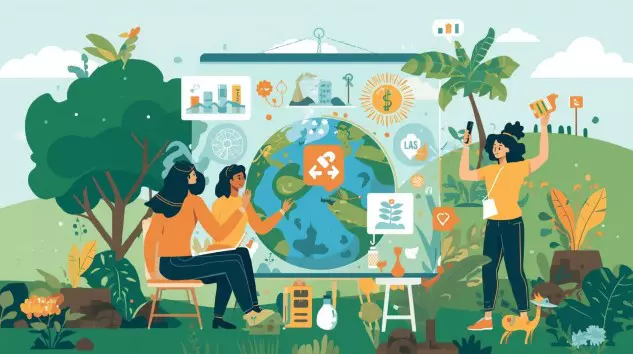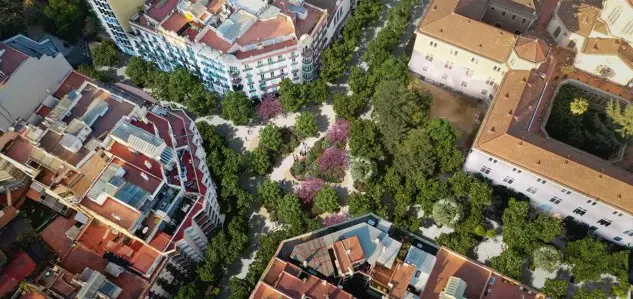Sustainable Lexicon
Climate Coaching: From Corporate Ambition to Daily Culture

The article explores how climate coaching empowers businesses and cities to integrate sustainability into everyday decisions and culture. It highlights real-world evidence from research and practice showing how coaching transforms climate goals into measurable actions. The article also outlines emerging trends, key frameworks, and practical steps for organisations aiming to build climate-aware leadership.
Read MoreClimate Coaching: From Corporate Ambition to Daily CultureSustainable Development and Climate Challenges: The Crucial Role of C:N:P Stoichiometric Ratios for Effective Ecosystem Management

Climate change threatens the balance of Earth’s biogeochemical cycles. The stoichiometric ratios of carbon, nitrogen, and phosphorus (C:N:P) shape ecosystem resilience, carbon sequestration, and nutrient flows. Human activities, such as intensive farming and the use of fossil fuels, distort these ratios, accelerating greenhouse gas emissions and soil degradation. Integrating stoichiometric principles into climate and land-use policies can strengthen ecosystem services, biodiversity, and long-term sustainability.
Read MoreSustainable Development and Climate Challenges: The Crucial Role of C:N:P Stoichiometric Ratios for Effective Ecosystem ManagementParticipatory Budgeting as a Tool for Smarter Cities: What’s Next?

What if ordinary citizens had real power over how city budgets are spent? From Porto Alegre to Paris, participatory budgeting is transforming how cities plan, prioritize, and spend. This article explores how a once-radical idea became a global tool for smarter, fairer, and more accountable urban governance — and where it’s headed next in the digital age.
Read MoreParticipatory Budgeting as a Tool for Smarter Cities: What’s Next?The 15-Minute City: A Vision for Sustainable Urban Living

Discover how the 15-minute city concept transforms urban living by making essential services accessible within walking or biking distance. Explore real-world examples from Paris, Barcelona, Melbourne, and others and learn how this model fosters sustainability, local economies, and a higher quality of life.
Read MoreThe 15-Minute City: A Vision for Sustainable Urban LivingBiodiversity Credits and Units: New Tools for Ecosystem Protection

Biodiversity credits and units are emerging tools to bridge the $700 billion funding gap for environmental protection. They allow businesses to invest in conservation, offering measurable, tradable benefits. Learn how these innovative solutions are shaping the future of biodiversity preservation.
Read MoreBiodiversity Credits and Units: New Tools for Ecosystem ProtectionThe Great Green Wall: A Transformative Project for Africa’s Future

The Great Green Wall is transforming Africa’s future by tackling desertification and restoring vital ecosystems in the Sahel region. Spanning 8,000 km, this groundbreaking project is not only improving the environment but also creating jobs, enhancing food security, and fostering peace. With global support, it’s a symbol of hope and unity in the fight against climate change. Read the article on to discover how this ambitious initiative is shaping a sustainable future for Africa and the world.
Read MoreThe Great Green Wall: A Transformative Project for Africa’s FutureSponge City: A Sustainable Solution to Urban Water Management.

The article explores the concept of “sponge cities” as a sustainable solution to urban water management amidst increasing global urbanization and climate change. Sponge cities use a combination of natural and engineered infrastructure, such as permeable surfaces, green roofs, and rainwater harvesting, to absorb, store, and reuse rainwater. This approach aims to reduce flooding, conserve water, and promote biodiversity while improving air quality and climate resilience. The article highlights successful global examples and discusses the challenges and future outlook for implementing sponge city principles worldwide.
Read MoreSponge City: A Sustainable Solution to Urban Water Management.NIMBY – Not In My Backyard

The “Not In My Backyard” (NIMBY) phenomenon reflects local opposition to projects affecting nearby areas. While it encourages civic debate, it can delay important initiatives due to distrust and emotional responses. NIMBY is a key aspect of democratic decision-making.
Read MoreNIMBY – Not In My BackyardMindful Leadership in Action: Paving the Path to Sustainable Development (Part 1)

In an era marked by climate change, social inequality, and economic uncertainty, sustainable leadership has become a vital approach for driving transformative change. This two-part article delves into the principles of sustainable leadership, emphasizing the importance of mindfulness, adaptability, and a long-term vision for success. Through real-world examples, it illustrates how sustainable leaders create value by aligning their organizations’ goals with the well-being of their employees, communities, and the planet.
Read MoreMindful Leadership in Action: Paving the Path to Sustainable Development (Part 1)